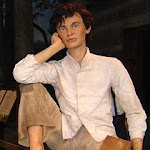In Lincoln’s day, they didn't have television, Wii, iPod, Illini football, major league baseball playoffs – Cubs or no Cubs – or most of other things which occupy our time today.
The events for which communities joined together were much different in 19th century Illinois. People found their entertainment in spending time with others. Some of the gatherings which brought people in droves to nearby communities for social and intellectual interaction were things like the spring and fall circuit court sessions and the great debates.
The lyceum movement in Lincoln's day
Another pastime of the day was joining together to hear men who presented speeches through Lyceum groups. In his book, Lincoln, David Herbert Donald speaks about the lyceum movement:
"This was the golden age of the lyceum movement, when men and women thronged the lecture halls and listened for hours to speakers who might edify, enlighten or, at least, amuse them."1
Modern day lyceum
I attended my own lyceum of sorts on Saturday, Oct. 11. I spent the day listening to six renowned Lincoln scholars celebrating the 150th Anniversary of the Lincoln-Douglas Debates with their rhetoric. The Lincoln Studies Center at Knox College in Galesburg, Illinois hosted The Twenty-Third Annual Lincoln Colloquium, in cooperation with Lincoln Home National Historic Site, The Indiana Historical Society, and the Chicago History Museum.
Knox’s Harbach Theatre holds about 450 people when it’s full. Those who were willing to wager a guess figured there were about 400 people there – a number of other Lincoln scholars, high school teachers, college professors, students – young and older, senior citizens and other interested parties from near and far.
Orators do Lincoln proud
Lincoln wasn’t there to try his hand at speaking, but these six orators would have given him a run for his money if this had been a competition. Their passion for their subject was genuine, and they held the audience as spellbound as Lincoln and Douglas surely did when they debated on the east side of Old Main that blustery Oct. 7, 1858.
Today’s sessions began with remarks from Knox College President Roger Taylor and Douglas L. Wilson, followed by papers presented by David H. Zarefsky, Rodney O. Davis, Allen C. Guelzo, James M. McPherson and Garry Wills. Between them, these scholar-authors hold two Pulitizer Prizes, five Lincoln Prizes, four Abraham Lincoln Institute Awards and a plethora of other honors – an impressive lot for sure.
Symposium for the ages - Springfield 2005
In 2005, when the Abraham Lincoln Presidential Library and Museum opened, I took advantage of the opportunity to hear more than 20 of the top Lincoln scholars speak, many of whom were at Knox today – and I even got to meet Brian Lamb of C-SPAN.
Lincoln scholars - tops in my book
I thought then, and I still feel now, that Lincoln scholars are some of the most sincere, supportive people I’ve ever met. As I meet more of them, I’m even more convinced I was correct. I'm not sure if Lincoln just attracts a certain type of person, or if, by studying him, his sincerity, concern for his fellow mankind and search for truth come through in the scholar, but there's just something about his group you understand best when you're in their midst.
I think “Honest Abe” would be proud to know that such genuine people are keeping his legacy alive. (Did you know he really didn’t like to be called “Abe”?)
I'll write more reflections on the day in future blog entries. For now, my strongest reflection is this:
The colloquim was magnificent. I met lots of people who’ve made significant contributions to the Lincoln world. I was edifed, enlightened and amused. (Professor Guelzo's reponsible for the amusement. He can be hilarious!)
Learn more about the lyceum movement
To learn more about the lyceum movement in Lincoln’s day, read Dr. Donald’s Lincoln. There are several references throughout the book.
1Donald, David Herbert, Lincoln, Jonathan Cape, London, 1995, p. 164.
© Copyright 2008 Ann Tracy Mueller. All rights reserved.

No comments:
Post a Comment